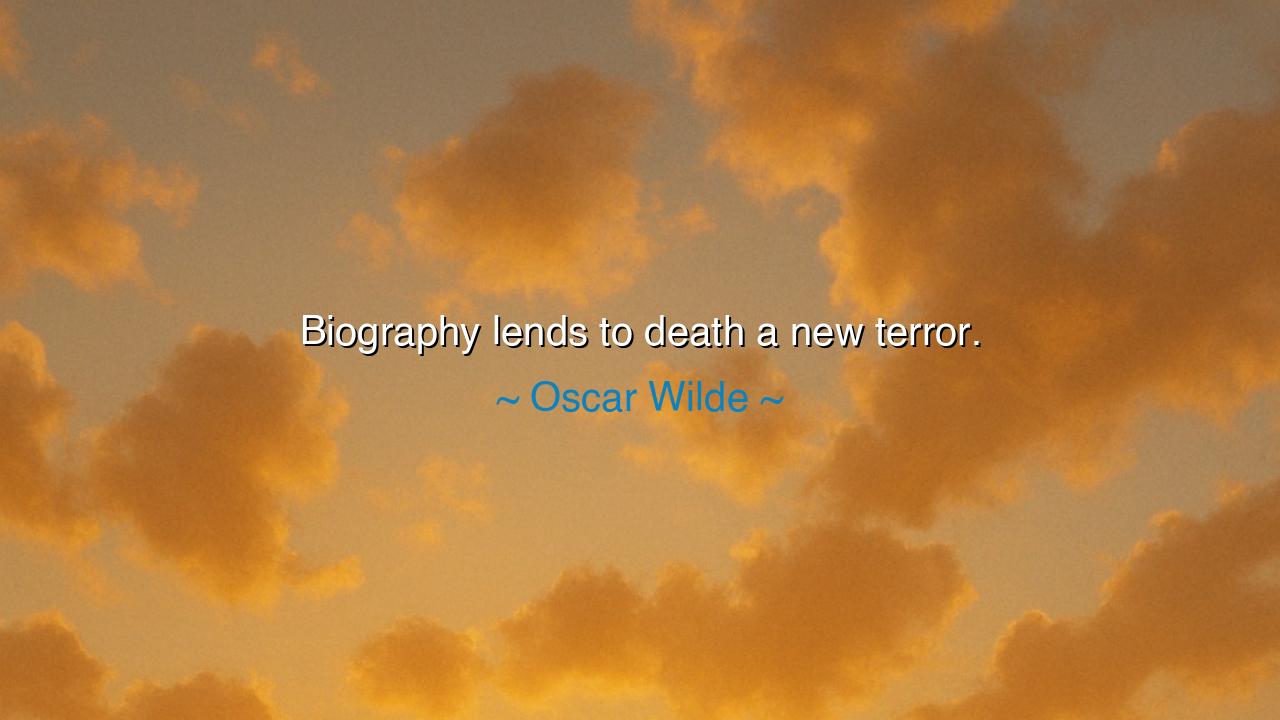
Biography lends to death a new terror.






In the haunting brilliance of Oscar Wilde, the master of paradox and truth, we encounter a saying that pierces through time like a blade: “Biography lends to death a new terror.” At first hearing, these words may seem like a jest, a clever twist of wit as only Wilde could deliver. But beneath their sparkle lies something ancient, profound, and unsettling—a reflection upon the fear of legacy, the dread not of dying, but of being remembered. Death ends a life, but biography—that persistent hand of history—keeps the soul exposed, examined, and judged by generations who never knew the living heart it describes.
Wilde, who himself would become one of the most written-about men of his age, understood the double-edged nature of remembrance. To die is to pass into silence, but to be written about is to live on in fragments, in distortions, in the interpretations of others. Biography, he suggests, can make death more terrible because it strips away the mystery of the human spirit and replaces it with the cold anatomy of reputation. What was once private becomes spectacle; what was once flawed yet human becomes dissected by minds seeking meaning or scandal. The terror lies not in the grave, but in the pen that outlives us.
Consider the fate of Cleopatra, the last queen of Egypt, whose story was told not by her people, but by her conquerors. To Rome, she was a temptress, a sorceress of the Nile who bewitched great men. To poets, she was tragedy incarnate. But who can say who she truly was? Her own voice was drowned in the writings of others, her truth lost to biography’s distortion. Wilde’s warning lives in her shadow: that once the living soul is gone, others will shape its memory to fit their desires. In this way, death gains a second life—a terror of misrepresentation, where one’s essence is bent by the will of the storyteller.
For Wilde himself, this terror was no abstraction. Condemned, imprisoned, and humiliated in his final years, he saw how swiftly the world that once adored him turned to mockery. After his death, his name was whispered with scandal, his genius cloaked in shame. And yet, as time passed, the ink of new biographers reshaped his ghost. From sinner he became martyr; from jester, prophet. His quote, then, is both prophecy and confession—he foresaw the curse of the posthumous life, where the dead are no longer free, but prisoners of the stories others tell about them.
But there is also a deeper wisdom here, one that touches every human heart. To fear biography is to fear the distortion of truth, yet to live rightly is to render that distortion harmless. The ancients believed that virtue was the only shield against oblivion. When Socrates faced his death, he said, “I go to die, and you to live; which of us goes to the better lot is known to none but God.” He did not fear the pen of Plato or the tongues of gossipers, for his life itself was his defense. The terror of biography belongs to those who live falsely; for those who live truthfully, no writer can harm them, and no story can truly bury them.
From this understanding, we may draw a sacred lesson: live so that your life needs no biographer. Let your deeds speak more clearly than your words, and let your kindness be remembered more than your fame. If others write your story, let them find a record of integrity, not ambition; of compassion, not vanity. Fear not the judgment of the future, but the silence of the present heart that fails to live with purpose. For death will come to all, but the truth of a life well-lived endures even when tongues lie and pens falter.
So, children of tomorrow, do not seek to be remembered—seek to be real. The terror Wilde speaks of fades when the life one lives is honest and whole. The ink of the biographer can twist, but it cannot erase the light of a righteous spirit. Build your story each day with courage, humility, and love, and no future historian can distort its essence. Let your biography, whether written or unwritten, be a song of truth rather than a shadow of fear. For in the end, death has no power over a life that has been lived without deceit—and the only true terror is to die without having truly lived.






AAdministratorAdministrator
Welcome, honored guests. Please leave a comment, we will respond soon